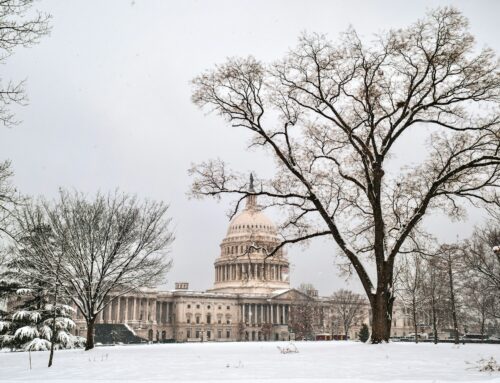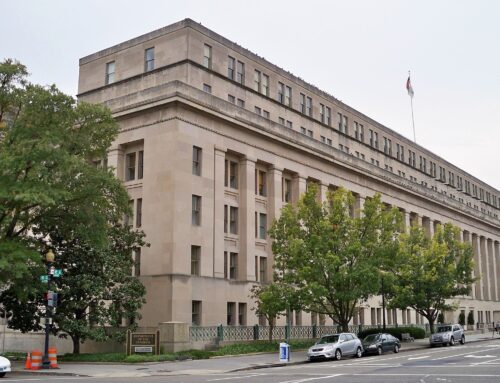May 13, 2025
Eliminate Costly Subsidies for Carbon Capture and Storage
Dear Member of Congress:
We write to express strong support for the 45Q Repeal Act of 2025 (H.R.1946), introduced by Representative Perry (R-PA) and cosponsored by Representative Khanna (D-CA). This legislation would repeal Section 45Q of the Internal Revenue Code, Credit for Carbon Oxide Sequestration. As one of the largest taxpayer-funded subsidies for carbon capture and storage (CCS) technologies, 45Q is projected to cost taxpayers more than $30 billion over the next decade.
CCS is often touted as an innovative solution for reducing emissions. However, its lack of scalability, heavy dependence on taxpayer subsidies, threats to private property rights through eminent domain, and long-term risks to public safety and community well-being make it a costly and ineffective endeavor at taxpayers’ expense.
Taxpayers for Common Sense (TCS) Action is a nonpartisan organization committed to ensuring that taxpayer dollars are spent responsibly and transparently. Over our nearly 30-year history, we have consistently raised concerns about federal support for CCS, particularly the high costs and lack of measurable outcomes.
Heartland Impact is the advocacy and outreach arm of The Heartland Institute, a national nonprofit research and education organization dedicated to promoting free-market solutions and fiscal responsibility. Heartland has long warned against using taxpayer resources to prop up industries and technologies that are unable to compete without government intervention.
Repealing 45Q is a fiscally responsible step to reduce waste, fraud, and abuse, while protecting landowners and communities.
Eliminating 45Q Safeguards Taxpayer Funds
Originally created in 2008 and most recently expanded by the Inflation Reduction Act, the 45Q tax credit is projected to cost taxpayers $36.2 billion over the next decade.[1] Despite its hefty price tag, the program has a troubling record of noncompliance and weak oversight that puts taxpayer funds at significant risk.
In implementing 45Q, the IRS has consistently failed to establish robust safeguards to ensure captured carbon remains sequestered. There are no requirement for on-site verification, no required technologies for carbon injection, and no enforceable timelines for monitoring and reporting potential leaks. Instead, taxpayers are funding hundreds of millions of dollars in claims each year based largely on self-certification, with no reliable method to verify how much carbon is stored—or whether it stays stored.
In 2020, the IRS reviewed 45Q tax credit claims made between 2010 and 2019, and found that 672 taxpayers had collectively claimed more than $1 billion in credits. An audit focused on 10 taxpayers who each claimed over $100 million—and together accounted for 99.9% of all credits claimed. These 10 taxpayers had received a combined $893.9 million in tax benefits without having to document whether the carbon they claimed to capture remained securely underground.
Despite generous subsidies and decades of federal research and development support, the CCS industry still has not demonstrated that it can stand on its own two feet. CCS remains prohibitively expensive, impossible to scale for widespread deployment, and ineffective at meaningfully reducing emissions. As of December 2023, U.S. CCS facilities captured just 22 million tons of CO2 annually—only about 0.4% of national emissions.
Repealing the 45Q credit would close a loophole that has enabled waste, fraud, and abuse since the program’s inception. It would protect taxpayer dollars and help ensure that federal spending better aligns with today’s energy and fiscal priorities.
CCS Threatens Private Property Rights
An equally troubling aspect of CCS development is its threat to private property rights. Many CCS developers claim “common carrier” status to justify the use of eminent domain—seizing privately owned land for CO2 pipelines and storage sites, often against the will of landowners. In many cases, property owners receive minimal compensation and have little meaningful recourse to challenge these takings.
This practice primarily serves private corporate interests, not the broader public good.[2] The abuse of eminent domain is particularly concerning given that many CCS projects are heavily subsidized by federal taxpayers. Taxpayer dollars should not be used to fund projects that undermine private property rights and force landowners into costly and contentious legal disputes.
This erosion of rights is not theoretical—it is happening now. When our tax dollars finance private gain at the expense of property owners, it undermines public trust in government programs and raises serious questions about fairness and accountability.
CCS Poses Public Health and Safety Risks to Communities
CCS infrastructure also poses serious public health and safety risks. Leaks during transportation or storage can have devastating consequences for nearby residents. In 2020, a CO2 pipeline operated by ExxonMobil-owned Denbury Resources ruptured near Satartia, Mississippi, releasing a cloud of CO2 that sickened dozens of people and prompted emergency evacuations.[3] More recently, in 2024, ADM’s flagship CCS facility in Decatur, Illinois suffered a major leak caused by corrosion in a monitoring well.[4] Just weeks after this news was made public, ADM reported a second potential leak, compelling the company to stop injections entirely and raising fears about contamination in Illinois’ Mahomet Aquifer—the sole drinking water source for nearly one million residents. These incidents underscore the inherent risks of transporting and storing carbon dioxide, particularly as more projects come online without adequate safety oversight or emergency response infrastructure in place.
Despite more than a decade of federal subsidies, commercial carbon capture and storage remains economically inefficient, heavily reliant on taxpayer subsidies, and laden with risks that threaten property owners and communities alike. We urge Congress to reconsider federal support for CCS by repealing the 45Q tax credit, strengthening oversight of taxpayer-funded projects, and protecting private property rights from eminent domain abuse.
By prioritizing fiscal responsibility and private property rights over wasteful spending on unproven technologies, Congress can demonstrate leadership that transcends party lines—and puts taxpayer interests front and center.
Thank you for your attention to this critical issue.
Sincerely,
Steve Ellis
President
Taxpayers for Common Sense Action
Cameron Sholty
Executive Director
Heartland Impact
[1] U.S. Department of Treasury, “Tax Expenditures.” https://home.treasury.gov/system/files/131/Tax-Expenditures-FY2025.pdf
[2] Heartland Institute, “Carbon Capture & Property Rights: There Is No Justification for Using Carbon Capture and Storage Projects to Abrogate Property Rights,” January 2025. https://heartland.org/opinion/new-paper-by-the-heartland-institute-dissects-how-carbon-capture-and-storage-projects-threaten-property-rights/
[3] Des Moine Register, “A carbon dioxide pipeline burst in Mississippi. Here’s what happened next,” September 2022. https://www.desmoinesregister.com/story/money/agriculture/2022/09/11/here-minute-details-2020-mississippi-co-2-pipeline-leak-rupture-denbury-gulf-coast/8015510001/
[4] Taxpayers for Common Sense, “Leaking Confidence: ADM’s Leaks Spotlight Risks of Carbon Capture and Storage,” October 2024. https://www.taxpayer.net/energy-natural-resources/leaking-confidence-adms-leaks-spotlight-risks-of-carbon-capture-and-storage/










